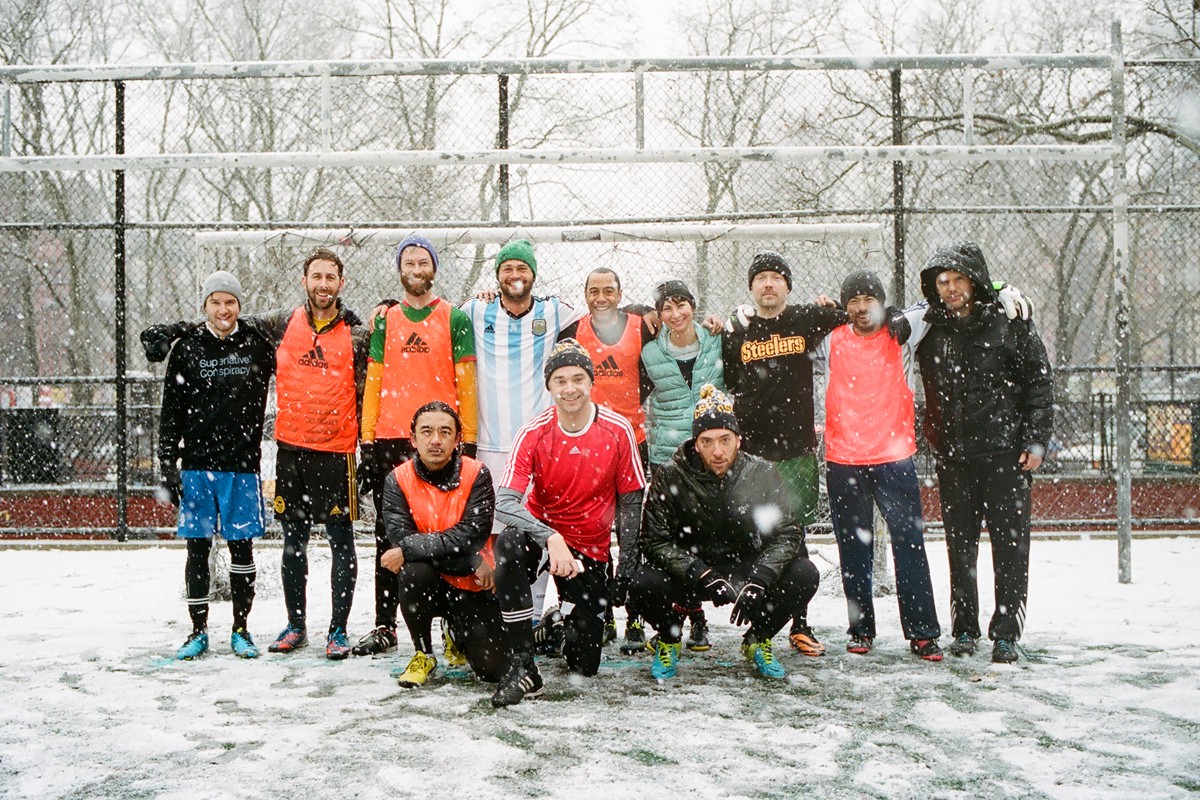A Chicago pick-up game achieves perfection

By Aleksandar Hemon
Photograph by Dominic Neitz
Editor’s Note: It has been a serious winter, and yet we continue to shovel aside the snow and kick a ball across frozen fields. We post this essay, which appeared in issue two, in honor of everyone who ventures out to play in the freezing cold.
[I] BIKE IN THE SNOW GULLIES on a Chicago street, on my way to a pick-up soccer game. The field on Chicago’s North Side where my friends and I play is made of ground-up tires adorned with some plastic grass on top, so it doesn’t completely freeze. On this particular winter Saturday, however, the pitch is coated in ice (a sudden Arctic freeze arrived on the heels of a warm-up earlier that week) under just enough snow to conceal the slippery surface. I had blown both of my knees playing soccer, so the wise course of action would be to bike back home. But I can see a yellow-and-blue ball rolling on the whiteness, a sight before which wisdom capitulates.
I can also see Johnny (an enormous Montenegrin Albanian whose real name is Aslan) and Georgie (Jorge, Ecuador-born, who has promised me that his life story is novel-worthy but has never told me any of it), picking the teams, haggling over various players. I dismount my bike, lean it against the fence, and join the kick-around. I kick the yellow-and-blue ball to Duncan, an Englishman, who is grumpy already: the teams are picked too slowly, it is too cold, and he has to go soon — his work is snow removal, so there’s plenty of it. Duncan kicks the ball over to Enes, who used to play professionally in Europe. He came to Chicago from Western Bosnia, as a refugee. During the war, Western Bosnia was controlled by forces collaborating with the Serbs and fiercely opposed to the government in Sarajevo, for which the government troops exacted a terrible revenge as they swept through at the end of the war. Consequently, Western Bosnians in Chicago and the U.S. refuse all contact with Bosnians proper and have their own festivals, soccer teams, shops. I do not know how bad Enes’ war experience might have been or where his loyalties lie, but we get along splendidly: he’s a great player and a kind man. Enes skillfully rolls the ball to Carl, an Arsenal supporter who has lived in Chicago for a very long time, Carl over to David, whose father in-law is the coach of the Serbian U-21 national soccer team. Winner, a fit, competitive motormouth Londoner in his twenties, who has come with a bad cold, hoping to “run it off,” receives the ball from David and makes an unnecessarily fancy move before he kicks it on to Charlie, who has played with Johnny/Aslan for 25 years and who remembers hundreds of the players the two have shared a field with. Charlie is always ready to dispense a good story about any of them, and I’m always ready to listen. He kicks the ball over to me.
In the cold, the ball is hard as a rock. We kick it around not to warm up — the ball against the foot triggers something in our brains, propels us to a game-ready trance. Jean-Paul, a Cameroonian, arrives dressed against the winter, complete with his sweatpants tucked deeply into thick socks; it is hard to imagine how he can move. It is already well past 8 a.m., the time we’re supposed to start — there are 13 of us, enough for a game.
Johnny and George have finally picked the teams and we’re on. The conditions are treacherous; playing is not unlike playing on ice skates. I slip at the goal line, barely escaping a blown knee; I fall on my back, narrowly avoiding a concussion, though my neck whiplashes — it’ll be sore and stiff for a week after the game. We forgo sliding tackles and rough plays and warn one another of particularly perilous spots, but the game is contentious, rife with yelling and taunting. My team quickly makes some good passes and goes three goals up. But the score matters less than the moment when everything comes together for us: Duncan sends the ball back to me in midfield, I pass it to Winner on the right side, he quickly sends it to Carl, who scores, tapping it in — we’re four goals up. It’s all simple and perfect. For an inexpressible moment, we sense the evanescent possibility of a harmonious world.
But then an ambulance’s wailing siren speeds down Ridge, the major thoroughfare next to the field, as if to remind us that our limbs and joints are at risk. Inside a fenced-off basketball court a dog is running in circles while its owner is visibly shivering. It is winter in Chicago, early Saturday morning; no one else is around. There is a monastic, spiritual quality to our playing in flesh-eating cold, whereby the intense in-the-body experience leads to epiphany. Each time a good pass is completed, against the icy odds, Winner laughs. Each time Enes scores, he giggles. We’re risking our limbs and livelihood because something good is happening.
The final score is 4–3, Enes providing all of the other team’s goals. We walk off the field, appreciating the fact that, miraculously, all of our joints are in place. Duncan sits down to perform his after-game ritual: a cigarette and a beer. Others file to their cars. I get on my frozen bike and go home. We’ll all be back next Saturday.

Aleksandar Hemon is a novelist in Chicago. He is the recipient of a MacArthur fellowship and has been a finalist for the National Book Award and the National Book Critics Circle Award.
Dominic Neitz is a photographer in New York City.
